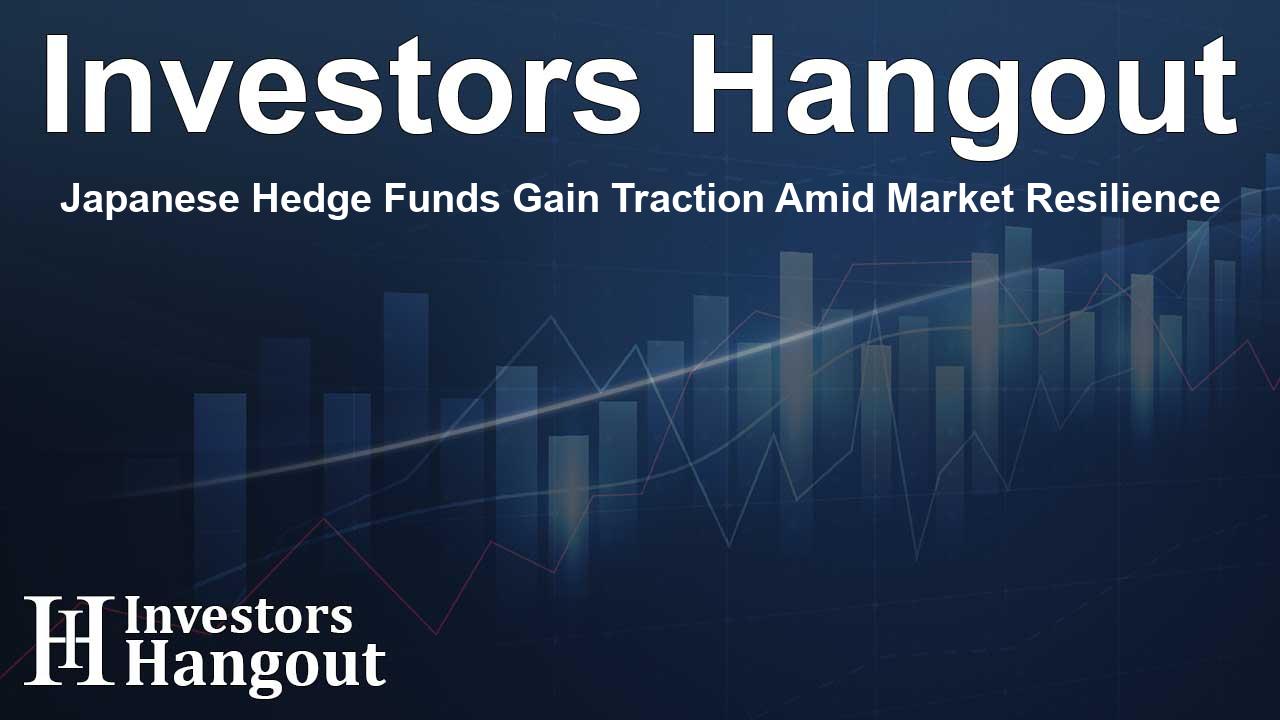Japanese Hedge Funds Gain Traction Amid Market Resilience

Japanese Hedge Funds Thriving in a Dynamic Market
Japan stands out vividly in the hedge fund sector, which is witnessing a blend of challenges and opportunities. Amidst a global hedge fund sector valued at $400 billion, Japan is attracting attention as it experiences a wave of new fund launches, particularly as other regions struggle with closures. This upswing indicates that despite the volatility experienced recently, Japan's capital markets continue to foster a favorable environment for investment.
Positive Trends in Japan's Hedge Fund Sector
In stark contrast to the overall trend in Asia, where hedge fund closures have been predominant due to economic strains in markets like China, Japan has enjoyed significant growth in its hedge fund landscape. Recent data from Preqin reveals that over ten new Japan-focused funds have been launched, signaling a robust interest in the region's investment potential. Furthermore, the third and fourth quarters of this year are expected to see at least five more funds debut, indicating a dynamic and enthusiastic investment climate.
Confidence in Japan's Financial Markets
The recent launches span various strategies from equity long-short to quantitative methods, demonstrating a diverse range of investment approaches. Investors are showing more confidence in Japan, a market that has historically been underappreciated by hedge funds and many institutional investors. Such confidence has surged despite recent market turbulence, reflecting a transformative shift in Japan's economic landscape.
Fund Managers Embracing Change
Industry experts, like Soichi Utsumi from Shinka Capital Management, are optimistic about Japan's evolving financial scene. He describes a significant shift marked by rising inflation and wage growth, which, according to him, haven't been seen in his extensive professional journey.
Market Performance and Strategies
The Japanese equity markets reached all-time highs in July, largely due to increased foreign investment and ongoing corporate governance reforms. This renewed interest is vital as managers prepare for future investments, concentrating on governance improvements and capitalizing on the impacts of rising interest rates.
Market Resilience Amidst Volatility
Although the market experienced a substantial setback in early August due to a notable Bank of Japan rate hike, this hasn't deterred hedge funds from pursuing Japanese investment strategies. ActusRayPartners, for example, is set to launch a new strategy aimed at raising $100 million by year-end, interpreting the market selloff as an opportunity rather than a setback. Such perspectives underscore a broader understanding of the evolving dynamics of the market and persistent investor interest.
Future Outlook for Japanese Funds
The support from local insurers, such as Dai-ichi Life, who are actively investing in emerging managers, reinforces the narrative of revitalizing Japan as a hub for asset management. This renewed focus is seen through various new fund initiatives such as the Penglai Peak Offshore Fund and the OQ Funds Management strategy. These developments spotlight the ongoing evolution of Japan's investment environment.
Challenges and Opportunities Ahead
The landscape, however, is not without challenges. Many global investors are contemplating reductions in their hedge fund allocations amidst lagging returns in comparison to key benchmarks. Nevertheless, Japan's long-short equity funds have performed relatively well, achieving positive returns in various quarters over the last five years, indicating a resilient portfolio strategy for savvy investors.
Frequently Asked Questions
What is driving the growth of hedge funds in Japan?
The growth is attributed to Japan's recovering financial markets, increasing foreign interest, and ongoing reforms in corporate governance, along with positive economic indicators like rising wages.
How many new hedge funds are expected to launch in Japan?
At least five more Japan-focused hedge funds are gearing up to launch in the latter half of this year, on top of the significant number that have already debuted.
What strategies are hedge funds in Japan focusing on?
Japan-focused hedge funds are exploring various strategies, including equity long-short and quantitative methods, to capitalize on the evolving market dynamics.
Has the recent market volatility affected investor confidence?
Despite recent market volatility, investor confidence remains strong, reflected in the new fund launches and the ongoing interest in Japanese assets.
What is the outlook for Japan’s hedge fund sector in the coming years?
The outlook remains optimistic as Japan continues to attract foreign investments, adapt to changing economic conditions, and improve its market attractiveness through regulatory reforms.
About Investors Hangout
Investors Hangout is a leading online stock forum for financial discussion and learning, offering a wide range of free tools and resources. It draws in traders of all levels, who exchange market knowledge, investigate trading tactics, and keep an eye on industry developments in real time. Featuring financial articles, stock message boards, quotes, charts, company profiles, and live news updates. Through cooperative learning and a wealth of informational resources, it helps users from novices creating their first portfolios to experts honing their techniques. Join Investors Hangout today: https://investorshangout.com/
Disclaimer: The content of this article is solely for general informational purposes only; it does not represent legal, financial, or investment advice. Investors Hangout does not offer financial advice; the author is not a licensed financial advisor. Consult a qualified advisor before making any financial or investment decisions based on this article. The author's interpretation of publicly available data shapes the opinions presented here; as a result, they should not be taken as advice to purchase, sell, or hold any securities mentioned or any other investments. The author does not guarantee the accuracy, completeness, or timeliness of any material, providing it "as is." Information and market conditions may change; past performance is not indicative of future outcomes. If any of the material offered here is inaccurate, please contact us for corrections.